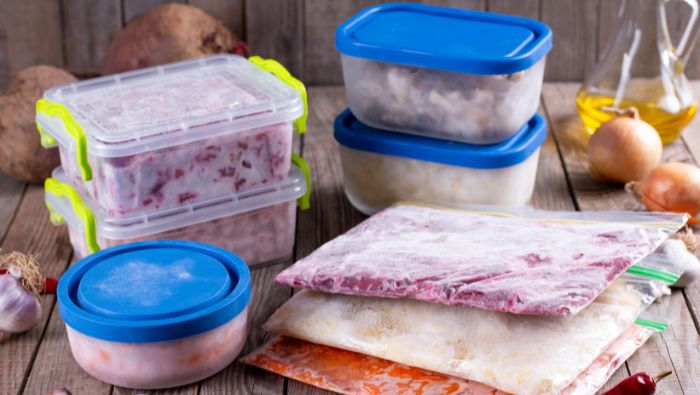Food Storage Tips for the Pantry, Fridge and Freezer
When it comes to proper food storage and the organization of your kitchen, attention to detail can help you cut food waste almost entirely. Try these tips to see how much waste you can eliminate.
by Andrea Norris-McKnight

Eating spoiled food can give you an upset stomach. But so can throwing out costly food that has gone bad, especially when you’re on a tight budget and can’t afford to throw money away.
by learning how to best store food in your pantry, fridge, and freezer, you can make food last longer, keep grocery bills lower, and avoid that sickening feeling when you’ve let your hard-earned cash get all moldy in the back of the fridge.
Pantry Storage Tips
You can prevent most food waste by keeping your pantry organized and storing things in airtight containers away from heat sources. A small investment in quality food storage containers can save you quite a bit of money in the long run. Or save and reuse jars or plastic containers with tight lids.
These tips can help you get your pantry items organized and stored properly:
- It is common to store snacks, such as chips and crackers, in original packaging since they are often accessed and used up rather quickly, but make sure these items are sealed tightly after opening. Kids may require that these foods be kept in their original packaging inside a larger airtight container if you find they do not always reseal things properly.
- Store dried beans, pasta, rice, flour, sugar, and other dry goods in airtight containers. Don’t rely on manufacturers’ packing seals to be tight enough for long-term storage. Properly stored dry goods should last for months.
- For stockpiled items, such as canned goods, use a FIFO (first in, first out) pantry storage system by storing new items behind older items. And keep like-items with like-items, so it is easier to see what you have on hand when making your shopping list.
- Keep oils stored in a cool, dry place and never out on the counter near the stove or in sunlight.
- Keep spices away from heat sources as well.
- Coffee and teas are typically sold in a box or bag meant for storage but won’t keep your beans, grounds, or leaves as fresh as an airtight container kept in a dark, cool place.
- Never store bread on top of the fridge or in the refrigerator. If you typically can’t use an entire loaf of bread before it goes bad, freeze part of each loaf. You’ll find freezer storage tips below.
- Produce that is best kept at room temperature typically needs airflow, so don’t store it in plastic bags. Bananas, onions, and potatoes all need to breathe, but bananas and tomatoes do better on the countertop, whereas onions, potatoes, and squash should go in the pantry. A quick search can tell you how to store any type of produce best.
Sign Up for Savings
Subscribe to get money-saving content by email that can help you stretch your dollars further.
Twice each week, you'll receive articles and tips that can help you free up and keep more of your hard-earned money, even on the tightest of budgets.
We respect your privacy. Unsubscribe at any time.
Refrigerator Storage Tips
Chances are, most of your food spoilage occurs in the fridge, whether leftovers that go bad or dressings that don’t get eaten before they expire. You can prevent quite a bit of food waste in your fridge by making these simple changes to your fridge organization and storage:
- Make sure your refrigerator is always below 40°F. 35°F to 38°F is ideal.
- Don’t over-pack the fridge. Cool air needs to circulate to keep everything at the right temperature.
- Know where to best store foods in your fridge. You might be surprised that some parts of your fridge stay colder than others. The top shelves will typically remain the most consistent in temperature, and the bottom of the refrigerator will stay the coldest (and best for meats). Keep dairy in the back of the fridge when possible and never on the door. Use the doors to store things that aren’t likely to spoil easily.
- If you often have leftovers, it can be helpful to designate one shelf for all leftovers so you can easily see what and how much you have with the oldest leftovers stored in the front. If possible, date leftovers or keep a list on the fridge to know what to eat up first.
- Once you get your fridge properly organized, try to keep things in the same place as much as possible. This will reduce the time the refrigerator must stay open (and the amount of cold air that escapes) while you find what you need.
- Ensure everything in the fridge is sealed, other than produce in the produce drawer. Open containers can cause your fridge to smell, or foods in open containers can absorb odors.
- Do not toss all fruits and vegetables together in the produce drawer of your fridge. The gasses from some can cause others to decay faster. Invest in some produce containers that control airflow, just like your fridge’s produce drawer, to help keep things separated.
Freezer Storage Tips
While food stored in the freezer will not spoil or get moldy, it can get freezer burn, which can drastically affect the texture and taste of the food. Proper storage and labeling of frozen foods and an inventory of your freezer’s content can be vital to preventing freezer burn.
- Keep your freezer at 0°F or lower.
- The coldest part of a chest freezer is at the bottom. The coldest part of an upright freezer is along the walls. This is where you want to keep your frozen meats.
- When freezing most foods not in original packaging, wrap in freezer plastic wrap and then foil. This will prevent most foods, from meats to breads, from becoming freezer-burnt.
- Remove as much air as possible from packaging when freezing foods, except when it comes to freezing liquids. Soups, stews, and pureed fruits and veggies will often expand slightly as they freeze, so you’ll need to leave a little air space in containers when freezing these items. For meats, remove as much air as possible.
- Not all foods freeze well. For instance, when frozen, sour cream and mayo can separate and become watery. High-water content fruits and veggies will become limp once thawed. If unsure whether a certain food can be frozen, do some research first.
- It can be hard to keep freezer items rotated as you do pantry items. If necessary, keep an inventory of your frozen foods with the date, a description, and the ‘use by’ date when applicable.
- Label everything that is not in original packaging. You might think you’ll recognize everything you wrap and freeze, but you likely won’t after several weeks.
- Make sure everything that goes in the freezer is sealed tightly. Even frozen foods can cause a foul odor.
How Much Will These Food Storage Tips Save You?
This certainly is not an all-inclusive list of best food storage practices. For foods you often lose to spoilage, a little homework on proper storage will help you preserve the freshness of these foods and extend their shelf life. For instance, nuts, many kinds of cheese, and even butter will last much longer when stored in the freezer.
When it comes to proper food storage and the organization of your pantry, fridge, and freezer, attention to detail can help you cut food waste almost entirely. Unfortunately, it can’t cut food costs completely, but you’ll be satisfied knowing your money didn’t get moldy in the back of your fridge or rot on your kitchen counter.
Reviewed June 2024
About the Author
Andrea Norris-McKnight took over as the editor of The Dollar Stretcher and After 50 Finances after working under the site founder and previous editor for almost 15 years. She has also written for Money.com, GOBankingRates.com, HavenLife.com and The Sacramento Bee.
Popular Articles
On After50Finances.com
- 9 Things You Need to Do Before You Retire
- You Didn’t Save Enough for Retirement and You’re 55+
- When Empty Nesters Reorganize and Declutter Their Home
- Reinventing Your Career in Your 50s or 60s
- What Mature Homeowners Should Know about Reverse Mortgages
- 2 Reasons to Collect Social Security Benefits As Soon As Possible


